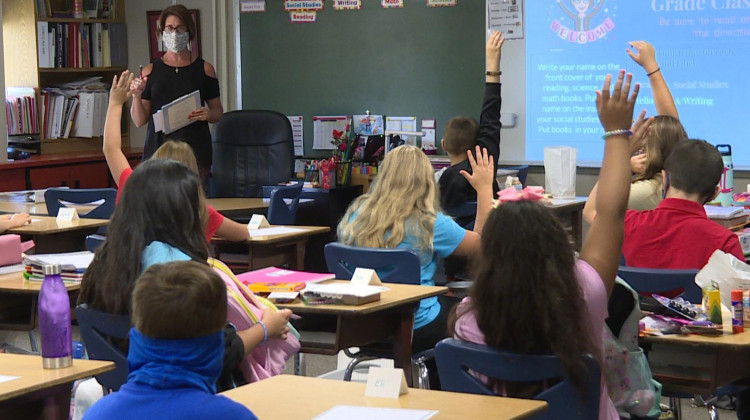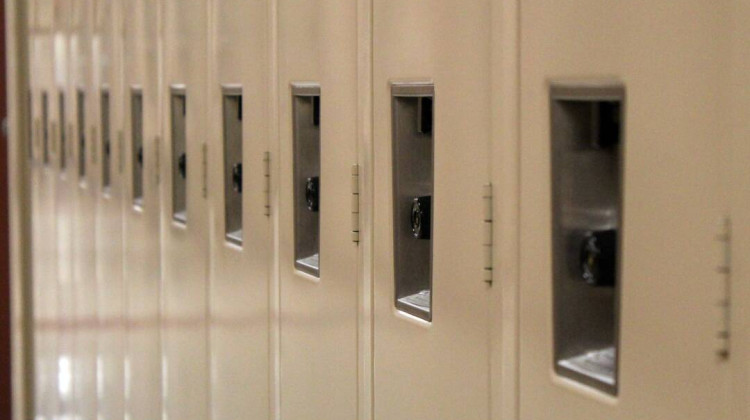
Supporters argue Senate Bill 486 will free teachers and administrators up to do their jobs in the way that best fits their local communities rather than responding to top-down mandates from the state.
FILE PHOTO: Jeanie Lindsay/IPB NewsIndiana is one step closer to peeling back a 50-year-old mandate requiring school administrators to discuss working conditions with teachers’ labor representatives. Supporters of Senate Bill 486 say changes like that will free schools from regulations they say are onerous.
“I've spent a considerable amount of time listening to educators to understand how can we eliminate some of these burdensome regulations,” said Sen. Linda Rogers (R-Granger), who authored the bill. “Also, I believe that students are best served when decisions can be made at the local level. Although there is nothing in this legislation that says schools cannot keep the status quo.”
The bill passed the House Education Committee Monday following nearly three hours of testimony, mostly from teachers speaking in opposition. The vote fell along party lines. The bill barely passed the Senate earlier this session after facing bipartisan opposition.
SB 486 would let school administrators choose not to discuss decisions about classroom sizes, curriculum and other similar topics with their teachers’ union representatives. The bill also would strip down teacher training and evaluation requirements currently in state law.
During testimony, provisions other than the first got limited attention. Opponents worry the bill will silence teachers' voices, leading to more leaving the profession and weakening the quality of education in Indiana.
“We're tired of screaming what we need and we're tired of not being heard. Teacher working conditions are student learning conditions. You will codify our silence with this bill,” said Allison Haley. “Teacher voice is imperative. Can we just call this what it is? An attack on a majority women profession that requires the demanding and exhaustive combination of intellect, professionalism and empathy.”
Haley is a high school teacher and local union president in Noblesville, where a 13-year-old shot and injured a teacher and another student in 2018.
“When we can't discuss why 15 teachers left mid year and there's no one to watch your kids, that's on you,” Haley said. “When we can't discuss safety and respond to a student threat, and Noblesville has another shooting, that's on you. All of those are discussable topics that might not happen … And that is on you. Please respect us and listen and vote no on 486.”
Supporters argue it’ll free teachers and administrators up to do their jobs in the way that best fits their local communities rather than responding to top-down mandates from the state.
READ MORE: Education 'deregulation' bill narrowly passes Senate despite bipartisan opposition
Join the conversation and sign up for the Indiana Two-Way. Text "Indiana" to 73224. Your comments and questions in response to our weekly text help us find the answers you need on statewide issues throughout the legislative session. And follow along with our bill tracker.
GOP lawmakers in favor of the bill have argued the change would ensure discussions about working conditions are more open to non-union teachers and are not limited to the 16 topics in state law.
“I like the idea that more people would have a voice,” said Rep. Becky Cash (R-Zionsville) “I think our superintendents and administrators want to hear the voice, and I hope that they're terminated if they don't.”
The idea that school administrators would want to maintain discussion without the mandate was a common refrain from the bill’s supporters like Robert Taylor, executive director of the Indiana Association of Public School Superintendents.
“I don't believe communication at the administrative level for a superintendent of public schools is an option. I believe it will have to and will continue,” Taylor said. “Can I guarantee that? No, I cannot. [I can] ensure you that we as an association will continue to advocate, train and facilitate all superintendents that we have in our association to become effective communicators.”
When asked whether the existing discussion requirements have been an impediment for school leaders, Taylor said “no.”
“But has it been required? And has the requirement been the productive component of the discussion? I would say no,” he said. “The productive component of the discussion has been the act of communication.”
Many of the teachers opposing the bill argued it is naive to believe that school administrators would consistently maintain open lines of communication without the mandate.
“I've worked for good administrators and I've worked for horrible administrators and those in between. Of course, every administrator is assuring that they're going to listen,” said Fort Wayne teacher Tom Bailey. “It's the same way the hunted wolf would assure the hounds that they are listening to the sheep.”
Several teachers brought up examples of administrators trying to ignore their voices in such discussions. They claimed that those administrators not only did not face repercussions for doing so from superiors, but sometimes they were also supported in that act.
"As a female teacher-leader, I have personally experienced more than once the dismissive attitude that predominantly male administrative leadership can have of educators' concerns," said Jennifer Smith-Margraf, a high school teacher in Lafayette. "Occasionally in my corporation, we have gotten to the point where we filed an unfair labor practice [charge], which every time we have won."
And in response to the bill’s supporters’ arguments that the change would open the discussion up to non-union teachers, opponents noted that nothing in the existing law prohibits administrators from having these discussions with them too. And, they say, teachers’ union representatives often seek out non-members' input and represent their concerns during these discussions too.
The bill would also remove yearly training requirements on topics like student homelessness. Originally it removed more, like annual seclusion and restraint trainings, but the House committee amended the bill to restore that and few other requirements.
Taylor, with the Indiana Association of Public School Superintendents, said he didn't “agree with all of the amendment.”
“We do support Senate Bill 486 from the point of the deregulation and the fact that we believe it will assist in the efficiency of the management of school corporations and also assist in the efficiency of teacher retention and where the requirements are not as constraining and as conflicting as they have been in the past,” he said.
The bill would also strip down state teacher evaluation requirements in favor of letting districts set their own expectations and methods. The committee’s amendment also added a requirement for districts to report the results of their evaluations to the state and made a few other changes.
Adam is our labor and employment reporter. Contact him at arayes@wvpe.org or follow him on Twitter at @arayesIPB.
9(MDAyMzk1MzA4MDE2MjY3OTY1MjM5ZDJjYQ000))
 DONATE
DONATE







 Support WFYI. We can't do it without you.
Support WFYI. We can't do it without you.